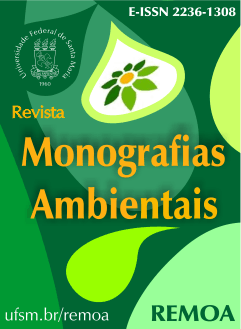Percepções e avaliações do consumo de água em escolas públicas da mesorregião geográfica Triângulo Mineiro/Alto Paranaíba (MG)
DOI:
https://doi.org/10.5902/2236130814271Keywords:
Water consumption in schools, Environmental education, Water rational useAbstract
To promote environmental sustainability it is urgent, in all segments of society, the review of how water consumption is done and, especially, the adoption of practices and technologies to make better use of this resource and decreasing waste. In public school units is frequent the inappropriate use and also loss of water by conservation conditions of hydro-sanitary systems. The paper presented here is conducted to question about how water consumption is conducted in public schools in the region of Triangulo Mineiro. The aspects studied were separated by sector (bathroom, kitchen, indoor and outdoor area), which included the identification of water consumption, the practical procedures for cleaning and maintenance and the habits of users. Understanding the main aspects related is taken as main reference to proposition of guidelines in environmental education projects for the water rational use.
Downloads
References
AULETE, C. Mini dicionário contemporâneo da língua portuguesa. Rio de Janeiro: Nova Fronteira, 896 p., 2004.
CHEUNG, P. B.; KIPERSTOK, A.; COHIM, E.; ALVES, W.C.; PHILIPPI, L.S.; ZANELLA, L.; ABE N.; GOMES, H.P.; SILVA, B.C.; PERTEL, M.; GONÇALVES, R.F. Consumo de água. In: GONÇALVES, R. F. (Coord.). Uso Racional de Água e Energia: conservação de água e energia em sistemas prediais de abastecimento de água. Vitória: ABES-PROSAB, 350 p., 2009.
FIGUEIREDO, C. R. Equipamentos hidráulicos e sanitários. Brasília: UnB, 2007. Disponível em: http://portal.mec.gov.br/seb/arquivos/pdf/profunc/13eqhidrasan.pdf. Acesso em: 30 maio, 2014.
GONÇALVES, O. M.; ILHA, M.S.O.; AMORIM, S.V.; PEDROSO, L.P. Indicadores de uso racional da água para escolas de ensino fundamental e médio. Ambiente Construído, Porto Alegre, v. 5, n. 3, p.35-48, jul./set. 2005.
OLIVEIRA, F. R. G. Consumo de água e percepção dos usuários para o uso racional de água em escolas estaduais de Minas Gerais. 2013. 193 f. Dissertação (Mestrado em Engenharia Civil) – Universidade Federal de Uberlândia, Uberlândia, 2013.
TOZONI-REIS, M. F. C. Formação dos educadores ambientais e paradigmas em transição. Ciência & Educação, Bauru, v. 8, n. 1, p. 83-96, jan., 2002.
VIMIEIRO, G. V. Educação ambiental e emprego de equipamentos economizadores na redução do consumo de água em residências de famílias de baixa renda e em uma escola de ensino fundamental. 2005. 105 f. Dissertação (Mestrado) – Escola de Engenharia, Universidade Federal de Minas Gerais, Belo Horizonte, 2005.
YWASHIMA, L. A. Avaliação do uso de água em edifícios escolares. 2005. 185 f. Dissertação (Mestrado) - Curso de Faculdade de Engenharia Civil e Arquitetura, Universidade Estadual de Campinas, Campinas, 2005.
Downloads
Published
How to Cite
Issue
Section
License
Ethical guidelines for journal publication
The REMOA is committed to ensuring ethics in publication and quality of articles.
Conformance to standards of ethical behavior is therefore expected of all parties involved: Authors, Editors, Reviewers, and the Publisher.
In particular,
Authors: Authors should present an objective discussion of the significance of research work as well as sufficient detail and references to permit others to replicate the experiments. Fraudulent or knowingly inaccurate statements constitute unethical behavior and are unacceptable. Review articles should also be objective, comprehensive, and accurate accounts of the state of the art. The authors should ensure that their work is entirely original works, and if the work and/or words of others have been used, this has been appropriately acknowledged. Plagiarism in all its forms constitutes unethical publishing behavior and is unacceptable. Submitting the same manuscript to more than one journal concurrently constitutes unethical publishing behavior and is unacceptable. Authors should not submit articles describing essentially the same research to more than one journal. The corresponding author should ensure that there is a full consensus of all co-authors in approving the final version of the paper and its submission for publication.
Editors: Editors should evaluate manuscripts exclusively on the basis of their academic merit. An editor must not use unpublished information in the editor's own research without the express written consent of the author. Editors should take reasonable responsive measures when ethical complaints have been presented concerning a submitted manuscript or published paper.
Reviewers: Any manuscripts received for review must be treated as confidential documents. Privileged information or ideas obtained through peer review must be kept confidential and not used for personal advantage. Reviews should be conducted objectively, and observations should be formulated clearly with supporting arguments, so that authors can use them for improving the paper. Any selected referee who feels unqualified to review the research reported in a manuscript or knows that its prompt review will be impossible should notify the editor and excuse himself from the review process. Reviewers should not consider manuscripts in which they have conflicts of interest resulting from competitive, collaborative, or other relationships or connections with any of the authors, companies, or institutions connected to the papers.






